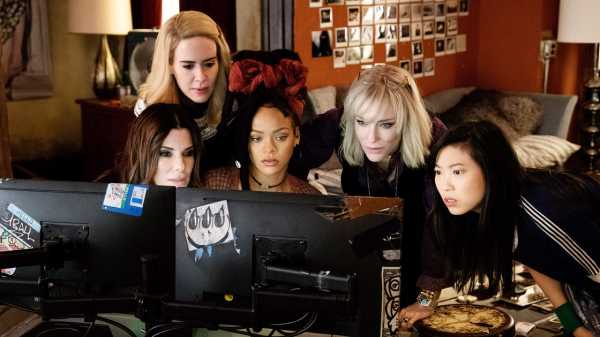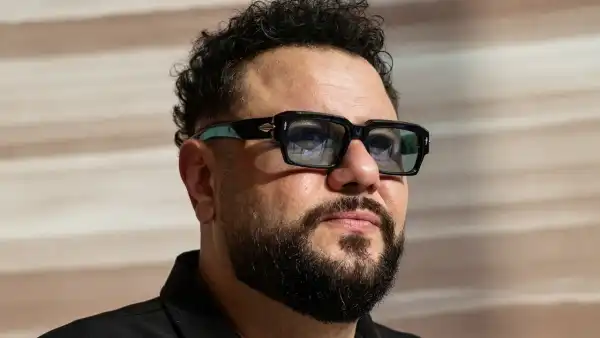
Each of the stars of “Ocean’s 8” has, mathematically, a thirty-eight-per-cent bigger portion of the movie’s time than do those of “Ocean’s Eleven,” yet the new film nonetheless distributes that time unevenly and gives many of its actors insufficient shares. Such ensemble films exemplify the concept of “quality time,” since they sharply limit the quantity of time that any one performer can get onscreen. “Ocean’s 8” rises and falls on the creation of vivid moments, of characters distilled into gestures and inflections. But the substance and the style of the performers that emerge in alluring flashes is engulfed by a black hole of a dramatic framework, a central emptiness that is a built-in problem of the heist-film genre in the age of digital technology.
When Debbie Ocean (Sandra Bullock), Danny’s sister (rather, now the late Danny’s sister), is paroled after more than five years in prison, she gives the lie to her parole-board plea before she even passes through the gates: she puts a cigarette-running deal in place with a guard (Deidre Goodwin). Then, leaving prison in the splashy gown she came in with, Debbie heads straight for Bergdorf Goodman, where she scams a sales clerk out of cosmetics, and then to the Plaza Hotel, where, through sharp surveillance, fast thinking, and smooth talking, she scams herself into a room on another guest’s credit card. Reuniting with her former partner in crime, Lou (Cate Blanchett), who’s now underhandedly managing a night club, she unveils—in the course of a city-scenic meal at Veselka—a plan that she’d cooked up in solitary: a robbery at the Metropolitan Museum, in the course of the Met Gala, of a famous and rarely seen Cartier necklace called the Toussaint, which features six pounds of diamonds and is worth a hundred and fifty million dollars.
To prepare for the job, Debbie and Lou recruit a team of exquisitely skilled criminal artisans, and “Ocean’s 8” offers its sharpest doses of delight in this setup, in the quasi-documentary glimpses of grifters doing their daily work and making the round of introductions with which Debbie’s ensemble gets filled out. There’s a jewelry expert named Amita (Mindy Kaling), who’s desperate to leave her family’s shop; a brilliant hacker nicknamed Nine Ball (Rihanna); a pickpocket named Constance (Awkwafina) who runs a three-card-monte table in a park; and Tammy (Sarah Paulson), another of Debbie’s former associates, who’s now fencing household goods from her suburban garage. But the setup is a colossal one that ventures far from Debbie’s immediate circle of criminal connections and, for that matter, reaches peculiarly far into the realms of media and celebrity and involves the manipulation of news and infotainment. It depends on the recruitment of a fashion designer on the downside named Rose Weil (Helena Bonham Carter), who owes money, risks prison, and can be roped into the scheme. It also involves the unwitting participation of an actress named Daphne Kluger (Anne Hathaway), a high-profile guest at the Met Gala, who will be maneuvered and manipulated into wearing the Toussaint to the event and will be the target of the robbery—and who, in the course of that robbery, displays a sangfroid to match that of the criminal band.
When it comes to the long con, the entire country is currently a victim of one, and among the fascinating details that are emerging in the course of journalistic and criminal investigations is the sheer amount of schmoozing, the bland amiability and hearty warmth alike that’s shared among conspirators and marks. This is hinted at in “Ocean’s 8,” but the director, Gary Ross (who co-wrote the script with Olivia Milch), never takes the time to develop it—which is all the more unfortunate given the varied range of characters who are implicated in the action. (It also shies away from the democratic notice of the many people making an ordinary living from major criminal enterprise; “Ocean’s 8” is strictly a view from the criminal heights.) Ross has a brisk camera style that delivers a few unexpected angles and maintains a pumped-up pace but never lets the actors breathe; their vivid performances are like jazz improvisations cut down to a bar at a time.
Yet where “Ocean’s 8” really collapses on itself is in the climactic heist itself, a grand set piece filmed at the Metropolitan Museum, complete with crowds of celebrities and hordes of staff on hand to make the event run—a staff that, it’s hardly a spoiler to divulge, Debbie Ocean’s crew manages to infiltrate. The sheer weight of sophisticated technology that’s brought to bear on the scheme—including indetectably recording eyeglasses that transmit enormously complex visual files to a 3-D jewel cutter that works in real time, fancy magnetic alternations, and computer-hacking wiles—displaces the action toward science fiction, and even toward the superheroic. The movie’s deft and daring criminals are, so to speak, standing on the shoulders of scientific giants whose gizmos they’re able to procure invisibly. “Ocean’s 8” takes these sophisticated wonders for granted, without implicating a wider web of witting or unwitting accomplices from the ostensibly neutral realm of technology. As the robbery unfolds, the bandit-heroines become simply and seemingly effortlessly able to do anything, and, despite the movie’s ostensible realism, impossible leaps and bounds and transformations of the Marvel-ous variety wouldn’t be out of place in it; the drama is emptied of struggle and uncertainty. (Other recent heist films—including Steven Soderbergh’s “Ocean’s Eleven,” which sets the template for this movie—fall into this trap.)
The movie toys with stereotypes that it seems to mock but also silently depends on. In the heist scene, for instance, it’s not giving away too much to say that the team’s criminals of color end up impersonating members of the waitstaff at the gala or other service personnel. It’s exemplary of the movie’s celebrity-centricity that the one character—and the one performer—who delivers a hint of a story that reaches outside the movie’s limits is the white actress, Daphne Kluger, and the actress, Anne Hathaway, who incarnates her. Whatever margin of pathos the comedy reserves, it reserves for her—and, for that matter, Daphne’s dilemma, as a celebrity both on a pedestal and in crisis, reflects back onto the very making of the film.
The very existence of a film like “Ocean’s 8” makes an odd double assertion: remakes or reboots putting women into roles originated in movies centered on men prove (as if anyone doubted it) that women can be as good as men in any role—but also that their movies can be as bad as any in which men star. “Ocean’s 8” isn’t bad—it’s simply not up to the talents of its cast. But its existence (like that of the “Ghostbusters” reboot, as I wrote at the time), and the prominent roles it provides to excellent actresses, is a good thing for the art of movies over all. Hollywood now rarely makes good movies, but it’s in effect a huge money-laundering operation: it pays actors well and gives them both the financial resources and the industry profile to produce or insure the production of significant low-budget movies that are made expressly to embody their makers’ experience, perspective, talent, and art, rather than to fit a marketing slot.
That dream, and promise, of independence fits slyly into the story of “Ocean’s 8,” which includes a clever epilogue about how the women use the money that they get from—it’s no spoiler—pulling off the heist. All of the actresses in “Ocean’s 8” need movies of their own, in which they can give free rein to their experiences, their talents, and their points of view. And if “Ocean’s 8” is the long-plotted means to that end, so be it. There’s a dramatic oddity in the movie that points to the place in the industry that its stars uneasily occupy. Whereas the films in the “Ocean’s Eleven” franchise feature a pair of male criminal elders (played by Elliott Gould and Carl Reiner), there’s no female veteran of crime on hand in “Ocean’s 8” to take part, share in wiles, serve as a mentor or a more experienced accomplice. Instead, Gould does show up early on, playing the same character as in the earlier films—to discourage Debbie from doing the job.
Sourse: newyorker.com






